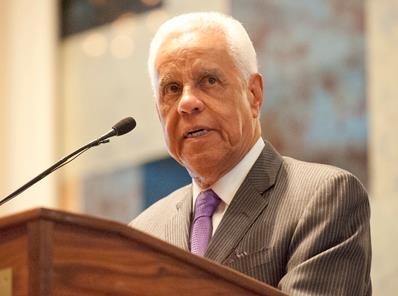As I’ve stated before, I have taken no position on the bona fides of the Navy Hill project for Downtown Richmond. Still, as we enter this new year, it seems that lingering questions remain unanswered. The clearest example of this is revealed in a recent Q & A with Richmond Mayor Levar Stoney and Mark Robinson published in the Richmond Times-Dispatch on December 31, 2019.
The answers to the questions may be baffling to some, but not unexpected given all that we know at this juncture.
I will reference a few examples here:
RTD: It has been a couple of years since you had your big housing summit [in October 2017]. You still haven’t introduced the package of ordinances that would promote affordable housing, which you promised. When do you aim to do so?
Stoney: We’ve tackled affordable housing in a few ways, obviously, with the eviction diversion program; that’s one end of the spectrum. Then you have homelessness. You’ve seen me champion the opening of homeless shelters — whether it’s in Manchester or even the [proposed] shelter on Chamberlayne Avenue in North Side, as well. I’ve created a goal of 1,500 affordable housing units by 2023. We’re well on our way on that. We’ll have an update in 2020 on that. What you’ll see from me in 2020 is a comprehensive approach to housing in the city at all different levels.
RTD: Is that going to be first quarter, second quarter?
Stoney: I’m not going to put a timeline on it, but you will hear from the administration. Normally I give a ‘State of the City’ speech in January. Seems like an opportune time to do so.
RTD: Let’s pivot into this little economic development deal that’s before the City Council. This has come up in the council’s discussion of the [$1.5 billion] Navy Hill proposal over the last few months: Why hasn’t your administration committed to conducting an appraisal of the publicly owned land that is set to change hands if the council approves this deal?
Stoney: I think what we’ve done is we’ve taken into consideration all the community benefits that are involved in this project. That includes the upgrades in infrastructure, the cost avoidance of demolishing properties like the public safety building and the current Coliseum. We took all that into consideration when we negotiated this project. Right now, the $15.8 million [proposed sale price] is a negotiated price taking into consideration all the cost avoidance.
If the City Council sees fit that this is not a good number for them, I want them to articulate that. We introduced these ordinances back in August. The commission has done their part. Residents have showed up at a number of town halls and community meetings. It’s now time for the City Council to articulate and verbalize what they want to see strengthened in the project.
RTD: Certain council members have articulated they want to see an appraisal done. It’s not clear to me what would be the harm of knowing the actual market value of those city-owned properties.
Stoney: As I said, it was a negotiated price, a negotiated price that involves all those things I just told you. And we think it’s a fair value because we’re getting a number of community benefits: 20,000 jobs, affordable housing units, market rate units. We’re getting all that in the middle of a downtown that has only seen 2% growth while the city has seen 8% growth. So if the City Council wants to improve upon the Navy Hill project or if they want to strengthen the project, I want to hear them. I want to give them the proper time to kick the tires and look under the hood. They’ve had since August. It’s my hope that next year, in 2020, we’ll get to the decision-making time.
RTD: If it appears that this project does not have support of the council, will you withdraw it before a final vote?
Stoney: No. I think it’s decision-making time come Feb. 24. I think they’ve had ample time. As I’ve stated in the past, this is the most criticized, most studied, most talked about economic development project in the city’s history. And I think those involved deserve a vote. I’ll say this though: Simply saying “no” is not a plan. Saying “no” doesn’t get you jobs in the downtown area. Saying “no” doesn’t get you more affordable housing downtown. Saying “no” doesn’t get you $300 million in investment into black and brown businesses. So I think the people of the city deserve a little bit more than “no.” They deserve diligent, hard work from the City Council to kick the tires and offer suggestions, concerns and recommendations to strengthen this project.
In referring to council’s possible “no” to the project, Stoney says “… saying no doesn’t get the $300 million in investment into black and brown businesses.” The mayor does not say how the $300 million ‘set-asides’, ‘investment’ or ‘goal’ is to take place nor does he address whether that is legal. I previously challenged VCU’s President, Dr. Rao on that point raised in his Op-ed published in the Richmond Times-Dispatch on January 6, 2019.
I have previously pointed out the illegality of such a $300 million plan denounced by the U. S. Supreme Court in the City of Richmond v. J. A. Croson Co. case (1989).
I would say this to all of those in leadership positions, elected, appointed, or otherwise.
I continue to believe in my one-word definition of politics, MONEY.
As we enter this new year, let us remember that the “People” are usually ahead of the “Leaders” as they are most affected by the decisions, and that we should not continue any exclusion or delusion, as eventually, the truth will out.
Stay tuned.








